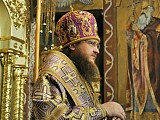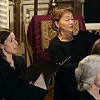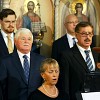—And for the Orthodox Church, what is the meaning of this event allowed by God?
—For world Orthodoxy, this question has to be divided into two components. The first component is the problem of Hellenism in its negative sense.
In a series of cases, Hellenism began malignantly reweaving the healthy fabric of church life in the Greek world. With the hands of its radical followers it placed world Orthodoxy on the verge of schism. Representatives of religious Hellenism—“Romeism”—as they call it, is without a doubt an incomparably small part of the Orthodox Church. But it is its historical part, just as Rome was in its time. And the possibility of it falling away would be no less a tragedy for world Orthodoxy than the events of 1054. As a consequence of this, we get the impression that the Lord is intervening in course of the Greek world that was progressively falling away from the purity of the faith of its fathers. The Lord has come to the aid of the Greeks to heal them of the new heresy of Eastern papism, to avoid a schism in Orthodoxy. This is a divine visitation, and divine salvation. That is why it is not at all surprising that the secular world, at God’s allowance, came down so hard on the Greek Church’s very right to serve Liturgy in their churches and celebrate Pascha. That very “world”—which the Phanar and its supporters only recently tried to please to the detriment of Orthodox unity—to the point where the very officials who just a half year ago twisted the Greek hierarchs’ hands into supporting the OCU scam and succeeded, are now showing the door to the same representatives of Greek clergy when they ask permission to serve the Liturgy somehow, somewhere. This is a good lesson. At the same time, we sympathize with those hierarchs who have always remained true to the patristic spirit of Orthodox canons. They probably understand quite well the spiritual causes for the current events and the possible consequences. May the Lord grant that this might be a good beginning for rethinking the causes that placed the world Orthodox Church on the verge of schism.
The second component of this matter has to do with the larger, main part of the Orthodox world. What is the significance of this trial; what conclusions should be drawn from what is happening; what does the Lord expect from us? Probably the main conclusion that we can draw already today is that we have shown ourselves to be completely unprepared for such contemporary challenges. We are acutely in need of rethinking the external forms of the life of the Orthodox Church in force majeure situations.
—That is, you consider that for the non-Greek part of Orthodoxy this is more likely a reminder of the shortness of time, a reason to prepare for the Apocalypse, rather than a punishment?
—I am not talking so much about punishment with regard to the Phanar as about bringing to them reason for correction. For the Phanariotes, this lesson is needed in order to become conscious of their destructive actions with respect to world Orthodoxy. But for the rest of the Orthodox world, and primarily for the Russian Orthodox Church, this period of trial is needed more for theological, canonical, and liturgical preparation to embark upon eschatological times. In this regard, the Russian Church [which includes the Ukrainian Orthodox Church.—Trans.] can and should become the flagman for world Orthodoxy. Not only because it is the largest and most populated, and only recently experienced an unprecedented rebirth after many decades of persecution against the faith, and in fact, possesses very great spiritual potential. But also because it is here that the stronger and healthier conservative forces in world Orthodoxy reside. Only by leaning on these forces can we safely discuss any new liturgical forms of Church life in extreme conditions.
—So, in your opinion we and the Phanariotes should draw different conclusions from what has happened. Meanwhile, the Russian Church is now under practically the same strict conditions due to the quarantine as the Greeks...
—Nevertheless, there is a difference. In the Constantinople Patriarchate, for example, from March 18 there was an order from the Patriarch to cease all divine services. Many dioceses of other Local Churches all over the world found themselves in the same situation.2 Meanwhile, on almost the entire territory of the Russian Orthodox Church, services are still being served, albeit not everywhere is there unlimited access for parishioners. In every church in Russia, Ukraine, Belorus, and Moldavia, there were services on Pascha. And that means tens of thousands of churches. And although not all of these tens of millions of believers can personally be at the services, people can arrange to receive the sacraments individually. Live streaming of services is happening everywhere. The situation is quite different from that what the majority of the faithful in the Greek tradition churches were in.
—And what do you think about live-streamed services? Considering everything that is happening, many are faced with the question: Can there be Orthodox spiritual life without churches?
—Active theological discussions have now ensued in the Church on this theme of whether or not we can live without churches. I will say right off that a time could come when whether we want it or not, we’ll have to live without churches, just as Christians lived without them in the first three centuries. May God preserve us from living to that time. But our task right now, for modern Orthodox Christians, is to think through and work out a form of life in the Church under any conditions, even when they take our churches away from us. After all, this could happen, sooner or later.
It is possible to live and be saved without magnificent churches. But it is not possible to live and be saved without the grace of the sacraments. The whole value of an Orthodox church is that here, the grace of the sacraments are poured into a person’s life. But the sacraments can also be served outside the church walls. A church can stand without the sacraments being served in them, bloodless, and deprived of their purpose and significance—like, for example, the Hagia Sophia in Istanbul. That is, man’s salvation is not in a church building, but in the sacraments of the Church. The time could come (let’s honestly and intelligently read the words of Revelation), when we will not have our churches. What then? Should spiritual life just stop? Should the sacraments cease to be served? Of course not. And our task is to think now about how we are going to live under such conditions. This world pandemic has pushed us into this.
Information came [at the time of this interview] that in connection with coronavirus all Orthodox churches in Australia will be closed for a half a year. A half a year! This should stimulate us to immediately and systematically begin developing alternative methods for the faithful to participate in the grace-filled sacraments of the Church.
—Do you think that the Orthodox Church will eventually allow confession through modern means of communication? Many are now arguing about this.
—I suppose that this is entirely possible. Moreover, under the current circumstances during the pandemic, these means of confession could even become the main means. But this or any other change in the form of administering a sacrament should undoubtedly be reviewed and blessed by our conciliar mind. This should not be a priest’s or bishop’s personal decision. In general, sacraments or rites that require personal contact or participation in something material cannot be administered from a distance. But confession is an exception to this. And this exception has come up a number of times in the spiritual life of Orthodox Christians in the twentieth century.
—And what about communion of the Holy Mysteries of Christ?
—In cases of disconnection between Christians and inaccessibility of churches, the faithful from the earliest centuries have practiced Communion of the reserved Gifts, which were reverently preserved in their homes. “In Alexandria and Egypt, almost every layman preserves Communion in their own homes and receives it when he wants,” writes St. Basil the Great in the fourth century (letter 93). If serious times come (eschatological persecutions, pandemics, widespread high radiation levels), our Church will be forced to return to this practice; but the reserved Gifts can only be given to those of the faithful whose church life is beyond all doubt. Every spiritual father in such times should have his own list of Church members, and the “walk-ins” will not be in that list.
The Liturgical Commission will also probably be assigned to work out a form of transfer and preservation of the Holy Gifts by laypeople, just as forms are now being worked through and proposed of transferring the Gifts to those Orthodox Christians dying in infection wards of hospitals, where priests are not allowed to go. Dried particles of the Holy Gifts wrapped in paper is an objectionable option. From the practical point of view, this is not very convenient and it is dangerous; any parish priest with experience of communing the sick at home will tell you that. With sadness I recently watched a video recording of how under conditions of the pandemic people are given Communion “with a napkin” in one church. Such liturgical self-will can of course lead to more practical and less dangerous forms. But it is better to think through these things thoroughly before the need arises, taking the experience of older generation pastors into consideration, than to start experimenting with Communion. If we do come to the point were we have to revive the practice of keeping the Gifts in the homes of laypeople, or administering the Body and Blood of Christ through lay medical personnel to those dying in infection wards, then the particles of the Holy Gifts will most likely be reverently encapsulated by the clergy in a soluble medical capsule (like powdered medicines). This could probably become the most usable form of transfer, preservation, and individual Communion of laypeople. Although, a priest sent the Holy Gifts to St. John the Russian in an apple...
—Vladyka, what do you have to say about participation in divine services online?
—This is a temporary practice. This is of course not complete participation in the services, but it is nevertheless better than nothing. It is possible that now millions of Orthodox all over the world are thanking God for this opportunity—to see and hear the services and pray with the clergy. Through the internet and other means of modern communication we can not only participate in the services.
Here we can find sermons by the clergy, edifying spiritual literature, church music, Orthodox films, and much else. But if they start to “round us up” in earnest, then this will be one of the first things they’ll cut off. Then we will remember how dissatisfied we were with online services... If someday we have to depart into the catacombs, as has happened before in history, then we will remember the internet with feelings of nostalgia. We have to appreciate what we have.















